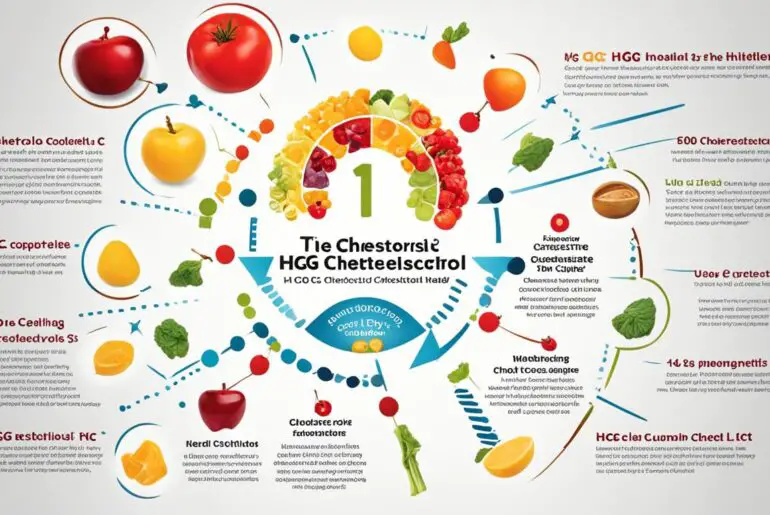Are you considering the HCG diet and wondering if HCG weight loss supplements are the key to shedding those extra pounds? Well, it’s time to unveil the truth behind this popular diet trend. In this article, I will provide you with evidence-based information and expert recommendations regarding the use of HCG supplements in the context of weight loss. Prepare to challenge your beliefs and discover the reality behind HCG diet program support.
Key Takeaways:
- The FDA advises against using over-the-counter weight loss products that contain HCG.
- Severe calorie restriction diets like the HCG diet may lead to temporary weight loss, but there is no scientific evidence supporting the effectiveness of HCG for weight loss.
- The HCG diet carries safety concerns and potential side effects, including nutrient deficiencies and inadequate protein intake.
- The HCG diet is not supported by scientific studies, and the initial study from the 1950s is not considered valid.
- The FDA has warned against using over-the-counter HCG products for weight loss and is actively working to remove illegal HCG diet products from the market.
The HCG Diet Explained
The HCG diet is a weight loss approach that combines a very low-calorie diet with the use of HCG hormone supplements. The theory behind the diet is that HCG can increase metabolism and reduce hunger, resulting in significant weight loss.
The diet is divided into three phases:
- Phase 1: This phase involves consuming high-calorie, high-fat foods for a couple of days to build up fat stores in the body.
- Phase 2: In this phase, daily calorie intake is restricted to 500 calories, and fat consumption is avoided. This phase typically lasts for several weeks.
- Phase 3: The third phase allows for increased food consumption while still restricting sugar and carbohydrates. This phase is aimed at stabilizing weight loss and transitioning back to a more sustainable eating pattern.
It is important to note that the weight loss observed during the HCG diet is primarily due to the severe calorie restriction and not the HCG hormone supplement itself. Scientific studies have found no evidence supporting the weight loss claims attributed to HCG hormone supplements. In fact, the United States Food and Drug Administration (FDA) has not approved HCG products for weight loss purposes.
I’ve noticed that some individuals experience temporary weight loss on the HCG diet due to the low-calorie intake. However, it’s important to understand the lack of scientific evidence supporting the role of HCG hormone supplements in long-term weight loss.
If you are considering the HCG diet, it is crucial to consult with a healthcare provider to understand the potential risks and benefits associated with this approach. It is always recommended to pursue weight loss methods that are backed by scientific evidence and prioritize overall health and well-being.
During your weight loss journey, it is best to work with healthcare professionals who can provide personalized advice and guidance tailored to your individual needs. They can help you develop a well-rounded and sustainable diet plan that focuses on balanced nutrition and regular physical activity.
Safety Concerns of the HCG Diet

The HCG diet poses several safety concerns and potential side effects that individuals should be aware of before considering this weight loss program. Reported side effects of the HCG diet include fatigue, irritability, restlessness, depression, fluid buildup, and swelling of the breasts in males. These side effects can significantly impact an individual’s well-being and overall quality of life.
One of the most serious concerns associated with the HCG diet is the risk of blood clots forming and blocking blood vessels. This can lead to life-threatening conditions such as heart attack or stroke. The severe calorie restriction on the HCG diet, typically ranging from 500 to 800 calories a day, can also contribute to nutrient deficiencies and inadequate protein intake.
The Food and Drug Administration (FDA) has issued warnings against using over-the-counter HCG products for weight loss. These products are not approved by the FDA and may not be safe for consumption. It is crucial to consult with a healthcare provider before starting any weight loss program, including the HCG diet, to fully understand the risks and potential side effects that may arise.
In their warning, the FDA states, “These products are marketed with incredible claims and promise unrealistic results. Despite numerous HCG products on the market, there is no substantial evidence that it increases weight loss beyond that resulting from the calorie restriction.”
It is important to prioritize your health and safety when embarking on a weight loss journey. By consulting with a healthcare provider, you can gain personalized guidance and recommendations that suit your specific needs and goals. They can help you explore alternative weight loss methods that are backed by scientific evidence and proven to be effective.
Remember, your well-being should always be the top priority. Choose a weight loss approach that promotes healthy habits, provides essential nutrients, and helps you achieve long-term sustainable results.
| Common Side Effects of the HCG Diet | Risks and Safety Concerns |
|---|---|
| Fatigue | Risk of blood clots |
| Irritability | Fluid buildup |
| Restlessness | Swelling of the breasts in males |
| Depression | Nutrient deficiencies |
Lack of Scientific Evidence
Scientific studies have consistently shown that the effectiveness of the HCG diet for weight loss is questionable, with no substantial evidence to support its claims. Despite assertions that the hCG hormone supplement can enhance fat burning and reduce hunger, there is a lack of scientific data to validate these assertions.
“The HCG diet’s premise is not based on sound scientific evidence. The initial study conducted by Dr. Albert T.W. Simeons in the 1950s, which popularized the HCG diet, has not been replicated and is considered outdated in current scientific research.”
In recent years, multiple studies have been conducted to examine the efficacy of the HCG diet, consistently indicating that weight loss is primarily attributed to the severe calorie restriction rather than the HCG hormone supplement itself. These studies have failed to find any substantial evidence supporting the weight loss claims associated with the HCG diet.
To date, there is no scientific consensus regarding the effectiveness of the HCG diet for weight loss.
The Role of Calorie Restriction
Research suggests that the weight loss experienced on the HCG diet can be attributed to the severe calorie restriction, typically ranging from 500 to 800 calories a day, rather than the hCG hormone supplement. This level of calorie intake is significantly lower than what is considered a healthy and sustainable approach to weight loss.
It is important to note that severe calorie restriction diets like the HCG diet can lead to various health risks, such as gallstone formation, irregular heartbeat, nutrient deficiencies, and electrolyte imbalances. These risks highlight the importance of adopting safer and more sustainable methods for weight loss.
Given the lack of scientific evidence and potential risks associated with the HCG diet, it is advisable to explore alternative weight loss approaches that prioritize a balanced diet, regular exercise, and lifestyle changes. Consulting with a healthcare provider or registered dietitian is recommended for personalized guidance and support in achieving long-term, sustainable weight loss goals.
FDA Warnings and Regulations
The use of HCG products for weight loss has raised concerns about their safety and effectiveness. The FDA has taken a strong stance on over-the-counter HCG products, warning against their use and declaring them potentially unsafe. These products, particularly those labeled as “homeopathic for weight loss,” are considered illegal as they have not undergone FDA evaluation for safety or effectiveness. In fact, the FDA is actively working to remove these products from the market.
It is important to note that FDA-approved HCG products are available only by prescription. These products are administered through injections and are closely monitored by healthcare providers.
Given the FDA’s regulations and warnings, it is crucial to be aware of the legality surrounding HCG diet products. Before using any supplements, it is highly recommended to consult with a healthcare provider who can provide guidance based on your individual needs and ensure your safety and well-being.
Potential Risks for Specific Dietary Restrictions

The HCG diet may pose additional risks for individuals with specific dietary restrictions. It is important to consider these dietary restrictions and consult with a healthcare provider before embarking on the HCG diet or any restrictive eating plan.
Potential Risks for Vegetarians
Vegetarians may struggle to obtain enough protein from sources other than meat while following the HCG diet. The diet’s creators suggest drinking extra skim milk to make up for the lack of meat protein. However, this recommendation may not be suitable for all vegetarians, especially those who avoid dairy products. It is crucial for vegetarians to ensure they are meeting their nutritional needs while following the HCG diet.
Potential Risks for Vegans
The HCG diet is not suitable for vegans. The recommended extra skim milk as a protein source is not aligned with vegan dietary preferences. Vegans avoid all animal products, including dairy. Therefore, they may find it challenging to obtain adequate protein while following the HCG diet. Vegan alternatives to meat and dairy should be carefully considered to ensure appropriate nutrient intake.
Potential Risks for Gluten Sensitivities or Celiac Disease
The HCG diet is not gluten-free and does not accommodate those with gluten sensitivities or celiac disease. Gluten is found in many grains and grain-based products, which are restricted on the HCG diet. Individuals with gluten sensitivities or celiac disease should consider alternative weight loss programs that cater to their dietary needs.
Please consult with a healthcare provider for personalized guidance based on your specific dietary restrictions and health requirements before embarking on the HCG diet or any restrictive eating plan.
| Dietary Restriction | Potential Risks |
|---|---|
| Vegetarian | Difficulty obtaining enough protein from non-meat sources; reliance on dairy products may not be suitable for all vegetarians |
| Vegan | Challenges in obtaining adequate protein without animal products; extra skim milk recommendation conflicts with vegan dietary preferences |
| Gluten Sensitivities or Celiac Disease | HCG diet is not gluten-free, restricting many grain-based products |
Challenges and Nutritional Concerns
Following a very low-calorie diet of 500 calories per day for an extended period of time can be challenging and uncomfortable. It is difficult to meet all nutritional needs on such a low-calorie intake, and deficiencies in vitamins, minerals, and protein are common. Adequate nutrition is essential for overall health and wellbeing. It is recommended to consume at least 1,200 calories per day and obtain nutrients from a variety of food sources. Severe calorie restriction diets like the HCG diet should be supervised by a healthcare provider to ensure proper nutrition and minimize the risk of nutrient deficiencies.
Expert Recommendations
When it comes to weight loss, experts advise seeking guidance from healthcare providers and registered dietitians, rather than relying on the HCG diet. Permanent weight loss is best achieved through a balanced diet, regular exercise, and healthy lifestyle habits.
Healthcare providers are equipped to provide personalized recommendations based on an individual’s specific needs and goals. They can monitor overall health and address any concerns or risks associated with weight loss methods. Consulting with a healthcare provider ensures that weight loss strategies are safe and sustainable in the long term.
It is important to prioritize safety and holistic well-being when considering weight loss strategies. By working closely with a healthcare provider, individuals can receive expert advice and support to achieve their desired weight loss goals.
“Seek guidance from healthcare providers and registered dietitians for safe and effective weight loss.”
Consultation with a Healthcare Provider
Consulting with a healthcare provider for weight loss is essential to ensure that the chosen approach aligns with an individual’s health needs and goals. A healthcare provider can provide a comprehensive evaluation of overall health, taking into account any underlying medical conditions, medications, and previous weight loss attempts.
During the consultation, the healthcare provider may recommend a combination of dietary changes, exercise routines, behavior modification strategies, and additional support services. These recommendations are tailored to meet individual needs and are based on evidence-based practices.
In addition, healthcare providers can closely monitor progress and make adjustments to the weight loss plan as needed. Regular check-ins with a healthcare provider offer accountability and support, increasing the likelihood of long-term success in achieving weight loss goals.
Consultation with a healthcare provider is especially crucial for individuals considering the HCG diet, given the lack of scientific evidence and safety concerns associated with this approach.
“Consulting with a healthcare provider ensures that weight loss strategies are safe and sustainable.”
Registered Dietitian’s Guidance
Registered dietitians are experts in nutrition and can provide valuable guidance for weight loss. They possess in-depth knowledge of how dietary choices influence overall health and can help individuals develop personalized meal plans that promote weight loss while ensuring adequate nutrient intake.
A registered dietitian can analyze current dietary habits, identify areas for improvement, and suggest specific changes to support healthy weight loss. They can address any nutrient deficiencies, offer meal planning tips, and recommend portion control strategies.
Moreover, registered dietitians can provide ongoing support and education, helping individuals navigate challenges encountered during the weight loss journey. Their expertise extends beyond the HCG diet, encompassing a wide range of evidence-based approaches that prioritize long-term health and well-being.
By working with a registered dietitian, individuals can gain the knowledge, skills, and resources necessary to make sustainable dietary choices and achieve their weight loss goals successfully.
“Registered dietitians can provide personalized nutrition guidance and support for effective weight loss.”
An Integrated Approach to Weight Loss
When it comes to weight loss, an integrated approach is key. It combines expert advice from healthcare providers, personalized recommendations from registered dietitians, and individualized strategies to promote healthy lifestyle habits.
An integrated approach to weight loss promotes the understanding that there is no one-size-fits-all solution. It recognizes that each person’s journey is unique and requires a customized plan that takes into account personal preferences, goals, and health considerations.
By combining the expertise of healthcare providers and registered dietitians, individuals can benefit from comprehensive care that addresses the physical, nutritional, and psychological aspects of weight loss. This multidisciplinary approach enhances the chances of achieving long-lasting and sustainable results.
Remember, successful weight loss goes beyond temporary fixes or quick results. It is a lifelong commitment to adopting healthy habits that support overall well-being and maintain a healthy weight in the long run.
| Benefits of Seeking Expert Advice for Weight Loss |
|---|
| Personalized recommendations based on individual needs and goals |
| Expert monitoring of overall health and well-being |
| Access to evidence-based weight loss strategies |
| Support in addressing concerns and risks associated with weight loss methods |
| Increased accountability and motivation |
| Focused guidance on sustainable lifestyle changes |
| Opportunity to address underlying medical conditions and medications |
Conclusion
Based on the lack of scientific evidence and safety concerns, it is clear that the HCG diet is not a recommended method for weight loss. The FDA has disapproved the use of HCG hormone supplements for weight loss due to their potential risks and the absence of proven effectiveness. While severe calorie restriction on the HCG diet may lead to temporary weight loss, it often comes at the cost of nutrient deficiencies and other side effects.
Instead of resorting to the HCG diet, it is advised to pursue safer and more sustainable weight loss methods. A balanced diet that includes a variety of nutrient-dense foods, coupled with regular exercise, is key to achieving long-term weight loss and overall health. Consulting with healthcare providers and registered dietitians can provide personalized guidance and support, ensuring a safe and effective weight loss journey.
When prioritizing weight loss goals, it is crucial to consider the evidence-backed recommendations and avoid potentially harmful fad diets like the HCG diet. Taking a holistic approach to weight loss by adopting healthy lifestyle habits will not only help shed unwanted pounds but also contribute to improved overall well-being. Remember, the path to successful weight loss lies in sustainable strategies and professional guidance.
FAQ
Are HCG supplements recommended for the HCG diet?
The FDA advises against using over-the-counter weight loss products that contain HCG. HCG is primarily used as a prescription medication for treating fertility issues and is not approved for over-the-counter use or for weight loss.
How does the HCG diet work?
The HCG diet involves combining a very low-calorie diet with the use of HCG hormone supplements. The theory is that HCG will increase metabolism and reduce hunger, leading to significant weight loss.
What are the safety concerns of the HCG diet?
The HCG diet carries several safety concerns and potential side effects, including fatigue, irritability, restlessness, depression, and fluid buildup. Additionally, severe calorie restriction on the HCG diet can lead to nutrient deficiencies and inadequate protein intake.
Is there scientific evidence supporting the effectiveness of the HCG diet?
Scientific studies have consistently found that the weight loss experienced on the HCG diet is primarily due to the low-calorie intake and not the HCG hormone supplement. The initial study from the 1950s by Dr. Albert T.W. Simeons, which popularized the HCG diet, has not been replicated and is not considered valid in current scientific research.
What are the FDA warnings and regulations regarding HCG products?
The FDA has issued warnings against the use of over-the-counter HCG products for weight loss, as they are not approved and may be unsafe. HCG products labeled as “homeopathic for weight loss” are considered illegal, as the FDA has not evaluated their safety or effectiveness. FDA-approved HCG products are only available by prescription and administered through injections.
What potential risks does the HCG diet pose for individuals with specific dietary restrictions?
The HCG diet may not be suitable for vegetarians, as it may be challenging to obtain enough protein from sources other than meat. The HCG diet is also not gluten-free and may not accommodate those with gluten sensitivities or celiac disease.
What are the challenges and nutritional concerns of the HCG diet?
Following a very low-calorie diet of 500 calories per day can be challenging and uncomfortable. Severe calorie restriction diets like the HCG diet can lead to nutrient deficiencies and inadequate protein intake, impacting overall health and wellbeing.
What do experts recommend for weight loss instead of the HCG diet?
Experts recommend seeking guidance from healthcare providers and registered dietitians for weight loss. Permanent weight loss is best achieved through a balanced diet, regular exercise, and healthy lifestyle habits. Healthcare providers can provide personalized recommendations based on an individual’s specific needs and goals.
What is the conclusion on the HCG diet?
The HCG diet has been disapproved by the FDA for weight loss due to lack of scientific evidence and safety concerns. It is recommended to pursue safer and more sustainable weight loss methods, such as a balanced diet and regular exercise. Consultation with healthcare providers and registered dietitians is crucial for personalized weight loss guidance and overall health management.




